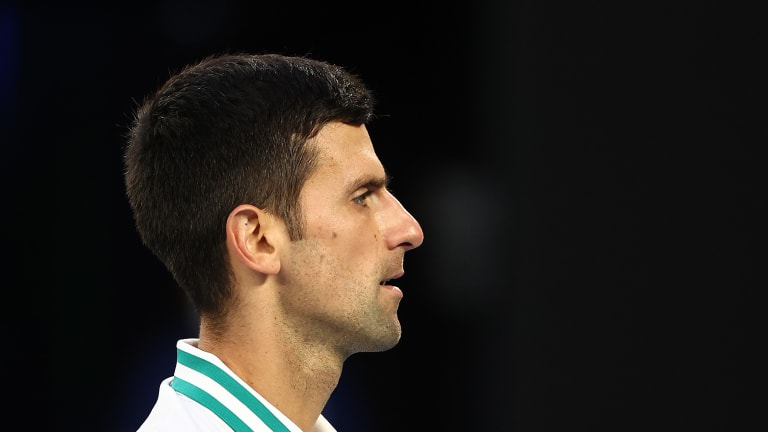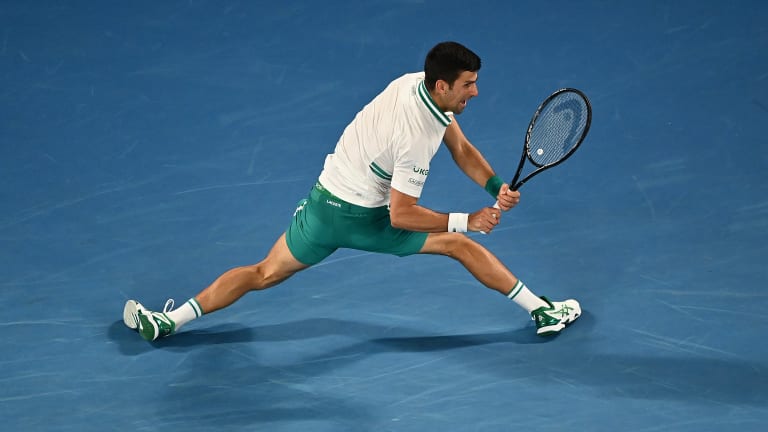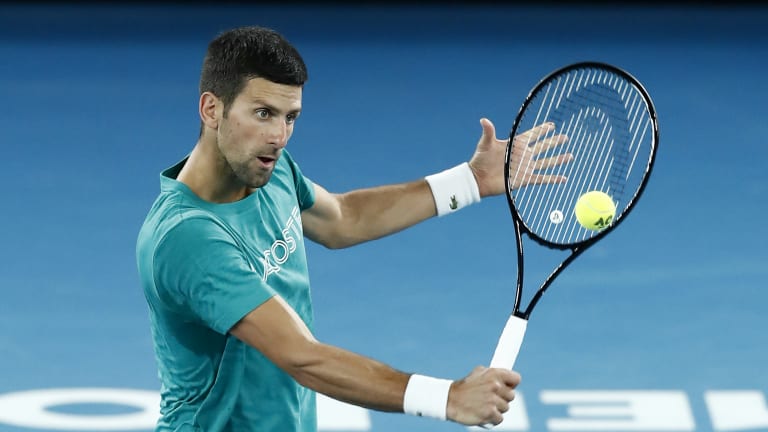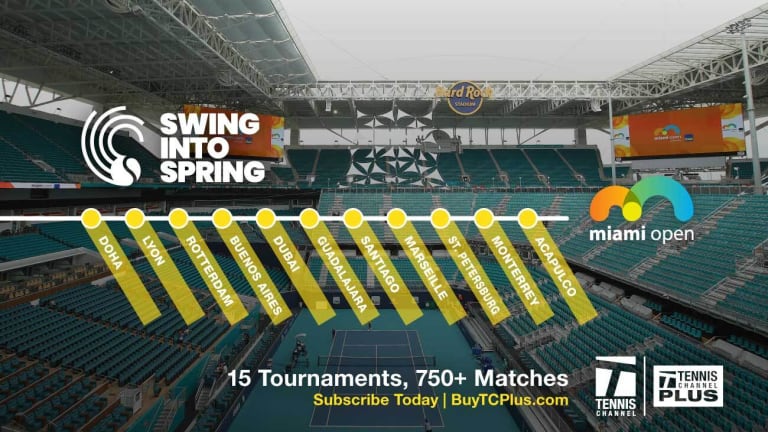The Rally: How notable is Novak Djokovic's new No. 1 ranking record?
Mar 09, 2021Roger Federer and Caroline Wozniacki step out at the Masters: “So much tradition”
By Baseline Staff Apr 13, 2025Richard Gasquet given Monte Carlo wild card 20 years after breakthrough win over Roger Federer
By Ed McGrogan Apr 03, 2025Wolfgang Puck: The biggest tennis fan in the kitchen?
By Mitch Michals Mar 12, 2025Serena Williams, Roger Federer, Aryna Sabalenka and pickleball all featured during Super Bowl LIX
By Liya Davidov Feb 13, 2025Roger Federer’s Wimbledon-winning racquet sells for more than $100,000 in tennis auction
By Liya Davidov Feb 10, 2025Roger Federer explains tennis scoring, On logo to Elmo in Super Bowl ad
By Baseline Staff Feb 10, 2025Roger Federer’s Wimbledon winning racquet currently up for auction
By Liya Davidov Jan 28, 2025Henry Bernet, Australian Open junior champion, takes inspiration from fellow countrymen Roger Federer and Stan Wawrinka
By Associated Press Jan 25, 2025The best tennis fashion moments of 2024: Federer & Nadal for Louis Vuitton, Kostyuk's viral Wimbledon dress and more
By Stephanie Livaudais Dec 14, 2024The Rally: How notable is Novak Djokovic's new No. 1 ranking record?
The all-time mark—377 weeks, held by Steffi Graf—is within sight.
Published Mar 09, 2021
Advertising
In this edition of The Rally, Steve Tignor and Joel Drucker talk about the significance of Novak Djokovic breaking the men’s record for weeks at No. 1, and how he has made the most of playing in the same era as Roger Federer and Rafael Nadal.
Hi Joel,
I was a little surprised to hear Novak Djokovic say, when it became clear that he would break Roger Federer’s men’s record of 310 weeks at No. 1, that this would allow him to cut back on his playing schedule and focus strictly on winning Grand Slam titles. I knew Djokovic wanted the weeks-at-No. 1 record, but I assumed he already put together his calendar based on what would help him peak for the majors. It was nice to be reminded, at a time when the general consensus is that “only the Slams count” for the top players, that he could be focused on breaking a mark that rewards consistent results over the long haul, and has nothing to do with the Slam chase. (I guess Djokovic also presumed, probably rightly, that Federer won’t add any more weeks to his No. 1 total.)
How highly do you rate this record, Joel? When I think of the résumés of the great champions, I typically put it right behind the number of major titles a player has won. Winning the Slams proves you can win when it matters most, at the events that your toughest opponents want the most. But reaching No. 1 proves you can have superior results over everyone else for an extended period. More impressive, of course, is staying at the top. That shows an ability to handle the pressure that comes with being expected to win every match you play, which is a lot harder than it looks or sounds.
When Djokovic began to rise in the rankings in 2006, he said right away that he wanted to be the next No. 1 after Federer. But I wasn’t sure if the role suited him. He was obviously capable on all surfaces, but he also was, and is, an emotional and sometimes volatile player, one who seemed like he might be prone to having lots of ups and downs over the course of a career. Just as important, he didn’t have a serve that could bail him out of tricky situations, like the player who owned the weeks-at-No. 1 record at that time, Pete Sampras. Djokovic has to earn his wins the hard way, by constructing rallies, making lots of balls, and doing lots of running. Which only makes the fact that he has done it better than anyone else for 311 weeks that much more impressive.
Of course, Djokovic has the men’s record. The all-time mark is 377 weeks, by Steffi Graf. I wouldn’t be surprised, even if he does lighten his schedule, if he breaks that one, too.
Joel, what do you think this record says about Djokovic as player and personality?

The Rally: How notable is Novak Djokovic's new No. 1 ranking record?
© Getty Images
Advertising
Getty Images
Hi Steve,
First, I agree with you that when it comes to major achievements, the number of weeks a player has been ranked No. 1 is darn close to the Slam singles tally. That accomplishment says much about Djokovic’s commitment to sustained excellence week after week.
One of the most remarkable aspects of Djokovic’s reign is that he’s done so while Federer and Nadal have continued to remain relevant. He’s done it with his brand of brilliance, discipline and creativity. And underneath all of that is a remarkable level of tenacity, perhaps most vividly demonstrated by Djokovic beating Federer at the majors three times from match point down.
Tennis geniuses like Djokovic have the ability to occupy past, present and future. In Djokovic’s case, when it comes to the past, that means displaying much of the sustained baseline prowess seen in the likes of Andre Agassi, Jimmy Connors and Chris Evert. Like those three, his ability to repeatedly strike the ball with pace, depth and accuracy is superb. Credit Djokovic’s formative coach, Jelena Gencic, for instilling him with such superb fundamentals. One can only imagine the exquisite detail covered in those early years.
In the present, of course, he has been masterful on all surfaces, often seamlessly transitioning from one to another with nary a gap in proficiency or performance.
As for the future, right down to this year’s title run in Melbourne, Djokovic is continuing to lay down the gauntlet. Hopefully, a smart junior today is studying Djokovic’s game closely—not simply to emulate it, but to overtake it. Will that require more power? Variety? Variations in court positioning? Bigger serves? Whatever the answer, by demanding so much from potential rivals, Djokovic has taken tennis forward in a major way.
Ten years ago, it wasn’t certain if that was going to happen. As 2010 ended, Djokovic was a man with one Grand Slam singles on his resume who’d spent the last several years ranked No. 3 in the world. There were times when I wondered if he was destined to remain a step behind Federer and Nadal.
But everything changed in 2011. Save for a lacuna that affected Djokovic from mid-2016 to mid-2018, he has proven profoundly sturdy.
It will be fascinating to see how Djokovic continues to manage himself. Amid the pandemic, matters of scheduling, pacing and fitness are major issues for all of the players.
Steve, what are your thoughts on how Djokovic will calibrate all these demands, both this year and perhaps even beyond?

The Rally: How notable is Novak Djokovic's new No. 1 ranking record?
© Getty Images
Advertising
Getty Images
Joel,
You say, rightly, “One of the most remarkable aspects of Djokovic’s reign is that he’s done so while Federer and Nadal have continued to remain relevant.”
That is undeniably true. Djokovic had to overtake two of the greatest players ever to own this record. But I wonder whether it has also helped him. With Rafa and Roger ahead of him, Djokovic had to dig deep and make the most of all of his talent to get to No. 1. Then he had to fight to stay there, because his two rivals were always ready to take the top spot back. When Djokovic won at Roland Garros in 2016 and completed his Djoker Slam, I felt like he had finally vanquished all of his competition. Which meant I wasn’t all that surprised when he suddenly went into a tailspin after that. Like a lot of top athletes, Djokovic thrives on proving himself, and with Nadal and Federer around, he’s always had something to prove. Having them ahead of him in the Slam chase has kept him focused in a way he might not have been had he broken all of their records years ago.
I like your point about how Djokovic has taken elements from tennis’ past, brought them up to date, and moved the men’s game forward. We have yet to see anyone advance it beyond him or do something truly new. Thiem, Zverev, Tsitsipas, Kyrgios: They all have their talents, but none has the mentality or consistency needed to win virtually every match they play, which is what Djokovic has been doing for a decade. To me, Daniil Medvedev is someone who has shown that he could do something new, who could beat Djokovic at his own game, and maybe add a few aspects of his own. But we saw what happened to him against Novak in Melbourne. Djokovic still has something to prove.
Joel, you mention Djokovic’s first coach, Jelena Gencic. She taught him the fundamentals, but she also instilled in him a rare self-confidence. “She told me I was going to be No. 1, and I believed her,” Djokovic told me back in 2007, before he had spent even a week there. Having that belief is a big part of why he’s still there today.
And while Djokovic’s weeks-at-No. 1 record may not be technically unbreakable, it may be a couple of decades before someone approaches it. Other than Roger, Rafa and Andy Murray, nobody playing today has even reached No. 2 in the rankings. (That will change on Monday, when Medvedev occupies the position.)
Joel, do you see Djokovic staying at or near the top for four or five more years?

The Rally: How notable is Novak Djokovic's new No. 1 ranking record?
© copyright Darrian Traynor
Advertising
Getty Images
Steve,
As much as I resist making predictions, in this case I’ll say it’s easy to imagine Djokovic staying ranked right up there for several more years.
He will turn 34 in May. But as the likes of Federer and Tom Brady have shown, the aging process in sports is very different than it once was. Certainly Djokovic is fit and formidable enough to age quite well.
One of Djokovic’s most admirable qualities is his constant pursuit of improvement. Djokovic’s great rise to the top and repeated Slam victories was highlighted by a major shift in diet that greatly aided his fitness. There have also been significant enhancements to the Djokovic forehand (more topspin), backhand (incorporating a slice) and net game.
More recently, Djokovic added more variety and pace to his serve, an effort no doubt aided by his coach, serving maestro Goran Ivanisevic. At the Australian Open last month, Djokovic hit more aces—103—than anyone in the tournament. Granted, only Medvedev played as many matches in Melbourne as Djokovic. But the point remains: Djokovic knows that as he gets older, a better serve will help him win points more easily.
So, as the champions like to say, Djokovic is doing as much as possible to take responsibility for what he can control.
Then there’s the matter of the competition. Such contenders as Thiem, Medvedev, Tsitsipas and Zverev are all trying to take high-grade offense to a new level. After all, they must if they’re to topple their accomplished elders. Here’s the question: How much better can those men get?
No one knows the answer. Heck, who had any idea how much better Federer would get after his first Slam win in 2003? Ditto for Nadal, who won four straight times at Roland Garros from 2005-’08, but had yet to win a major elsewhere—and then over the next three years snapped up all the other big titles? And, as I mentioned, who could foresee the incredible strides Djokovic would take once 2011 began?
But as far as Djokovic goes, he has so much going for him. It begins with that incredible technique—as efficient as anyone in tennis history. It continues with his work ethic and grit in the heat of battle. And the extra ribbon is his relentless desire to leave a major mark. I’m looking forward to seeing more of that.

The Rally: How notable is Novak Djokovic's new No. 1 ranking record?